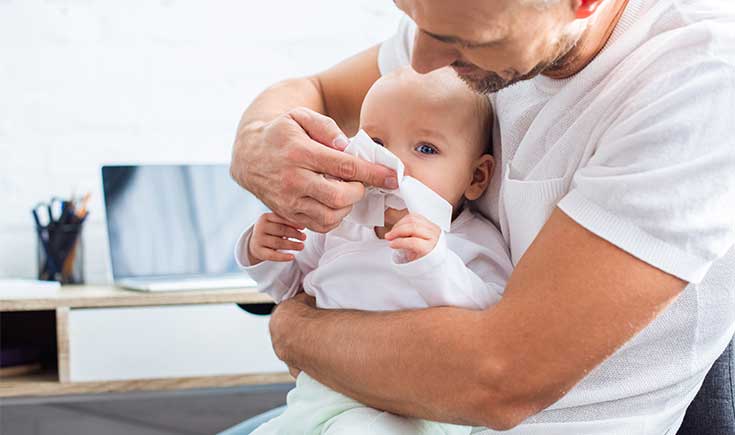

Particularly as a first-time parent, you might assume that your congested baby has a cold, but what you might not realise is that newborns usually sound stuffy when they breathe. Mild to moderate congestion is common, and usually nothing to be concerned about. If a newborn gets a cold, they will develop a runny nose like anyone else. So, if it isn’t a cold, why would a baby have a stuffy nose?
Let’s look at why babies are born congested, and how to deal with it
Congestion occurs when extra fluids accumulate in the nose or airways. It may give your baby a blocked nose, noisy breathing, or mild trouble feeding. Like an adult’s, a baby’s nasal passages are equipped with tiny hairs and mucus-producing glands to fight foreign invaders, thereby keeping viruses and air pollutants out of the lungs.
Many healthy babies are born congested, and may even sound stuffy for the first few months. This is due to the following:
- Some of the amniotic fluid gets into their nasal passages during birth, and it may take a few days to clear.
- Newborns don’t breathe regularly. You may notice that they take shallow breaths, followed by pauses, and then deeper breaths. The deeper breaths create the stuffy sound in the small nasal passages.
- Babies don’t know how to sniff to clear their nasal passages, as older children do.
- Newborns can’t breathe through their mouth for the first few months, so they have no choice but to breathe through their tiny nasal passages when congested.
Baby congestion treatments
Remember that increased mucus production is your baby’s way of protecting and clearing their body from viruses or air pollutants, so only use treatments if it’s seriously affecting their ability to breathe or feed. Do not use vaporub or cold medications, both of which can be dangerous or ineffective. You can usually just treat stuffy noses at home when necessary with the following remedies:
- Nasal saline drops Ask your GP for advice on the most suitable saline drops for a newborn, and apply one or two drops into the nose to loosen mucus. Doing so before feeds can help them to breathe better to feed effectively.
- Breast milk in the nose Some mothers feel that this works better than saline drops. Try carefully putting a little milk into their nose during feeds, and when you sit them up afterwards, the mucus should hopefully loosen and run out of their nose.
- Vaporiser Run a warm steam vaporiser in your baby’s room while they sleep to loosen mucus. Make sure to leave door slightly open.
- Nasal aspirator For quick and easy relief from nasal congestion, an aspirator can be used to suck the mucus out using either a manually or battery operated device. Look for one with parts that are dishwasher safe to conveniently keep them clean and sterile.
- Bath time You could give your baby a warm bath (even better, you could have one together for some bonus skin-to-skin time) to help clear the congestion. Alternatively, steam can be helpful, so run a hot shower and sit in the bathroom with your baby for a few minutes several times a day.
- Home air quality Keep the air free from cigarette smoke, perfume, scented candles, pet hair, and harsh cleaning and laundry chemicals. Open windows regularly to allow fresh air indoors if outside pollution isn’t an issue.
Baby congestion at night
Being congested while lying down flat can make sleep more challenging, resulting in an irritable baby. However, you must treat night time congestion as you would day time. Use any of the remedies listed above, but do not prop your baby up with pillows or elevate the cot mattress. Doing so increases the risks of SIDS and suffocation. If you want to hold your baby upright while they sleep, ensure that you stay awake, and take it in turns with your partner.
Signs that you should see your doctor
- See your doctor if things don’t improve after a couple of days, or they become worse.
- From about day five, your baby should have at least 5 wet nappies in 24 hours. If they don’t, they may be dehydrated and not getting enough calories, so speak to your GP.
- Go to your emergency room if there are signs of respiratory problems, such as rapid or hard breathing that interferes with sleep or feeding; flaring nostrils, which can be an indication that your baby is struggling to take in air; if you see your baby’s ribs suck in on each breath; moaning or grunting after each breath; or a blue tint to their skin, particularly around their lips or nose.
- If your baby under 3 months old starts to vomit or has a fever, seek medical advice immediately.























